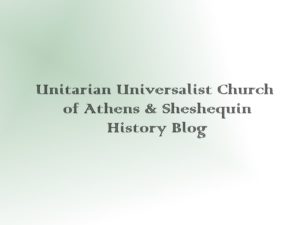Julia Kinney Scott, granddaughter of one of the Rev. Noah Murray’s first converts, was a member of the Sheshequin Universalist Society in the early 1830’s. She was renowned in Universalist circles for her writing, which soothed the suffering and encouraged the faithful. Her poetry and prose were published in both Universalist and non-denominational periodicals in the 1830’s and early 1840’s. A memoir of her life, including a collection of her poetry, was published in 1853. We have an original copy of this book in our library.
Julia Kinney moved to Towanda in 1834 and married Dr. David Scott in 1835. She was afflicted with tuberculosis early in her marriage and died of that disease in March, 1842. The following poem, “The First Snow,” was probably written in December, 1840, and was published in January, 1841, a little more than a year before she died. It shows her love of the beauty the natural world, but it also notes her sadness at her failing health and possibly hints at her anticipation of happiness after death.
The First Snow
I love to watch the first soft snow,
As it slowly saileth down;
Purer, and whiter than the pearls,
That grace a monarch’s crown;
Though winter wears a freezing look,
And many a surly frown.
It lighteth like the feathery down,
Upon the naked trees;
And on the pale and withered flowers,
That swing in every breeze;
And they are clothed in such bright robes,
As summer never sees.
It bringeth pleasant memories
The falling, falling snow;
Of neighing steeds and jingling bells,
In the happy long-ago;
When hopes were bright, and health was good,
And the spirits were not low.
And it giveth many promises,
Of quiet joys in store;
Of bliss around the blazing hearth,
When day-light is no more –
Such bliss as no where else hath lived,
Since the Eden-days were o’er.
God bless the eye, that views with mine,
The falling snow to-day;
May truth her pure white missions spread,
Before its searching ray;
And lead, with dazzling garments, towards
“The straight and narrow way.”


